Related Research Articles

Freikorps were irregular German and other European paramilitary volunteer units that existed from the 18th to the early 20th centuries. They effectively fought as mercenaries or private military companies, regardless of their own nationality. In German-speaking countries, the first so-called Freikorps were formed in the 18th century from native volunteers, enemy renegades, and deserters. These sometimes exotically equipped units served as infantry and cavalry ; sometimes in just company strength and sometimes in formations of up to several thousand strong. There were also various mixed formations or legions. The Prussian von Kleist Freikorps included infantry, jäger, dragoons and hussars. The French Volontaires de Saxe combined uhlans and dragoons.
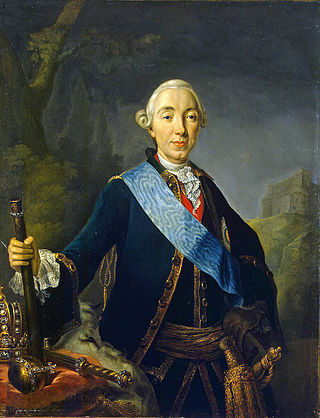
Peter III Fyodorovich was Emperor of Russia from 5 January 1762 until 9 July of the same year, when he was overthrown by his wife, Catherine II. He was born in the German city of Kiel as Charles Peter Ulrich of Schleswig-Holstein-Gottorp, the grandson of Peter the Great and great-grandson of Charles XI of Sweden.

October: Ten Days That Shook the World is a 1928 Soviet silent propaganda film written and directed by Sergei Eisenstein and Grigori Aleksandrov. It is a celebratory dramatization of the 1917 October Revolution commissioned for the tenth anniversary of the event. Originally released in the Soviet Union as October, the film was re-edited and released internationally as Ten Days That Shook The World, after John Reed's popular 1919 book on the Revolution.
Ernst von Salomon was a German novelist and screenwriter. He was a Weimar-era national-revolutionary activist and right-wing Freikorps member.

The West Russian Volunteer Army or Bermontians was a pro-German military formation in Latvia and Lithuania during the Russian Civil War from November 1918 to December 1919.

Mephisto – Novel of a Career is the sixth novel by German author Klaus Mann.
Max Wilhelm Kimmich, also known as M. W. Kimmich, was a German film director and screenwriter during the first half of the 20th century. He was the brother-in-law of Nazi Propaganda Minister Joseph Goebbels.
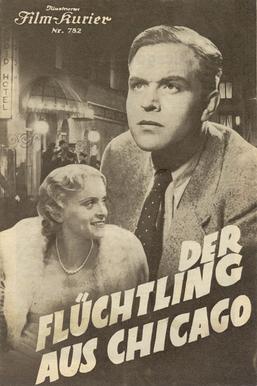
The Fugitive from Chicago is a German crime and adventure movie produced in 1933 by director Johannes Meyer. The screenplay was written by Max W. Kimmich, Hermann Oberländer and Hans Martin Cremer after the 1932 novel of the same title by Curt J. Braun. The film was a co-production between the film companies of Bavaria and Atalanta. Some scenes were shot at German motorcycle company Zündapp. The film's sets were designed by the art directors Max Seefelder and Erich Zander. It passed censorship on 23 January 1934 and was presented to the public on 31 January 1934 in Munich and on 22 February 1934 in Berlin.
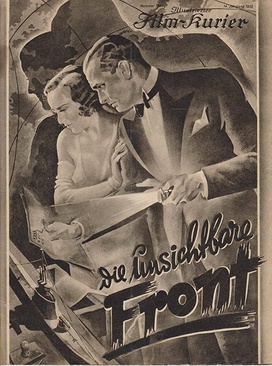
The Invisible Front is a 1932 German spy thriller film directed by Richard Eichberg and starring Trude von Molo, Karl Ludwig Diehl, Veit Harlan and Paul Hörbiger. The story was written by Robert A. Stemmle, Curt Siodmak and Max W. Kimmich, who also presented the idea of this film to his colleagues. It was made at the Johannisthal Studios in Berlin and on location in Hamburg. The film's sets were designed by the art directors Artur Günther and Willi Herrmann.

Under False Flag is a 1932 German spy thriller film directed by Johannes Meyer and starring Charlotte Susa, Gustav Fröhlich and Friedrich Kayssler. It was shot at the Johannisthal Studios in Berlin from the end of November 1931 to the beginning of 1932. It was made by Deutsche Universal, the German branch of Universal Pictures, in co-production with Tobis Film. The film's sets were designed by the art director Otto Hunte. It premiered at Berlin's Ufa-Palast am Zoo. The film was based on the novel of the same title by Max W. Kimmich, who also worked on the screenplay.
Artisten is a German circus movie from 1934 to 1935 starring Susi Lanner, Hans Junkermann, Hilde Hildebrand and Harry Piel, who also acted as director. The screenplay was written by Max W. Kimmich after the silent movie The secret of the circus Barré.

Ever in My Heart is a 1933 American pre-Code drama film directed by Archie Mayo and starring Barbara Stanwyck, Otto Kruger, and Ralph Bellamy. It portrays the tragic consequences of the virulent propaganda that spread false stories of atrocities and stigmatized anything German during the Great War.

Frisians in Peril is a 1935 German drama film directed by Peter Hagen and starring Friedrich Kayßler, Jessie Vihrog and Valéry Inkijinoff. Made for Nazi propaganda purposes, it concerns a village of ethnic Frisians in Russia.
I Was Nineteen is a 1968 East German film produced by Konrad Wolf for the DEFA studio.
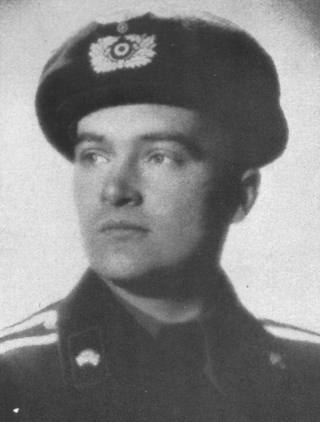
Kurt Eggers was a German writer, poet, songwriter, and playwright with close links to the Nazi Party. He served as both a member of a propaganda company (Propagandakompanie) and as a Waffen-SS soldier at the rank of Mann in World War II, he was killed while serving in a tank regiment on the Eastern Front by the Red Army.

Goodbye, Franziska is a 1941 German romance film directed by Helmut Käutner and starring Marianne Hoppe, Hans Söhnker and Fritz Odemar. It portrays the relationship between a globetrotting reporter and his devoted wife. The film was remade in 1957.
The Gambler is a 1938 German drama film directed by Gerhard Lamprecht and starring Eugen Klöpfer, Lída Baarová, and Hedwig Bleibtreu. It is based on Fyodor Dostoevsky's 1866 novel The Gambler. Due to the scandal over Baarová's affair with Joseph Goebbels, followed by her return to Czechoslovakia, the film was withdrawn from cinemas three days after its release. It was not given a release again until 1950. A similar fate had befallen another film of hers, A Prussian Love Story.
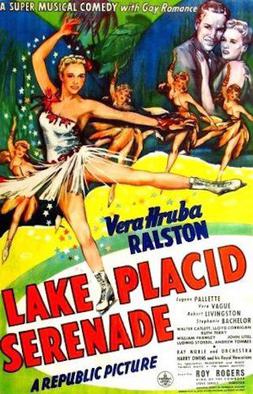
Lake Placid Serenade is a 1944 American musical romance film directed by Steve Sekely and starring Vera Ralston, Eugene Pallette and Barbara Jo Allen. Following the German invasion of Czechoslovakia a Czech ice-skating champion goes to stay with her Uncle in the United States.
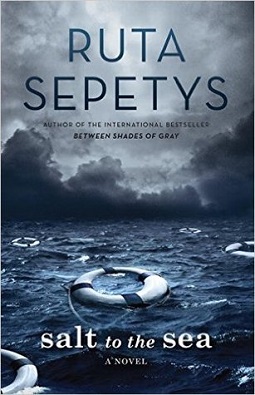
Salt to the Sea is a 2016 historical fiction young adult novel by Ruta Sepetys. It tells the story of four individuals in World War II who make their way to the ill-fated MV Wilhelm Gustloff. The story also touches on the disappearance of the Amber Room, a world-famous, ornately decorated chamber stolen by the Nazis that has never been recovered.
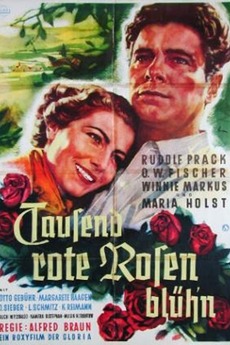
A Thousand Red Roses Bloom is a 1952 West German drama film directed by Alfred Braun and starring Rudolf Prack, Winnie Markus and O. W. Fischer. It was shot at the Göttingen Studios. The film's sets were designed by the art directors Hans Ledersteger and Ernst Richter.
References
- Klaus, Ulrich J.: German soundfilms. Film encyclopedia of full-length German and German-speaking sound films, sorted by their German first showings. - Ulrich J. Klaus. - Berlin [et al.] (Klaus-archive, Vol. 4. - 1935.)